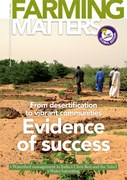Eric Holt-Gimenez argues the need for a pro-active movement based on land sovereignty to fight land grabbing.Farmers’ organisations, social movements and development NGOs need to find “common ground” to protect peasant farmers, forest dwellers, indigenous communities, family farmers and urban agriculture from the devastation of dispossession.
In what activists have dubbed the “global land grab”, transnational investment in land has grabbed media headlines worldwide. While attention has focused on the role of hedge funds, sovereign wealth and foreign purchases of vast tracts of land in Africa and Asia, recent research is uncovering a broader pattern. As land values increase, land ownership is concentrating everywhere – even where there have been few reports of foreign land grabbing.
Land deals driven by national and international capital expansion are occurring in areas of longstanding inequity, racism and conflict. They involve real estate speculation, mining, agrofuel production, industrial forestry, and “flex crop” production, often led by local elites. The patterns of dispossession are deeper, wider and potentially devastating for marginalised communities everywhere.
The responses to land grabs – thus far scholarly papers, media reports, place-based resistance and global campaigns for transparency and voluntary codes of conduct – have helped to bring the issue to public attention. But as land grabs spread around the world, it is becoming clear that regulating and writing about land grabs is not enough: land grabs must be stopped.
The challenge is for communities to mobilise for the right to land and territory before they are besieged by speculators, hedge funds or extractive industries. This requires a proactive strategy that goes beyond reactive responses to land grabs and actively advances alternative projects and alliances for land use and ownership. It also requires vigilance regarding the political, legal and infrastructural build-up that precedes land grabbing, so communities can prepare to resist.
Reversing the land grab trend demands a powerful, integrated response from under-served communities, civil society and social movements. It means building a pro-active global-local movement based on the right of communities and peoples to sustainable, land-based livelihoods; their right to have a democratic say in how the land they live on is used, and an equitable share in the social, environmental and economic benefits of that land. In short, it requires a broad-based movement for land sovereignty. Much like food sovereignty, land sovereignty brings together the demands of social movements from the South and North and from rural and urban settings.
Land grabs are making projects for food security and sustainable agriculture moot efforts… Farmers’ organisations, social movements and development NGOs need to find “common ground” to protect peasant farmers, forest dwellers, indigenous communities, family farmers and urban agriculture from the devastation of dispossession.
Eric Holt Gimenez
Eric Holt Gimenez is the Executive Director of Food First / Institute for Food and Development Policy.
E-mail: eholtgim@foodfirst.org

